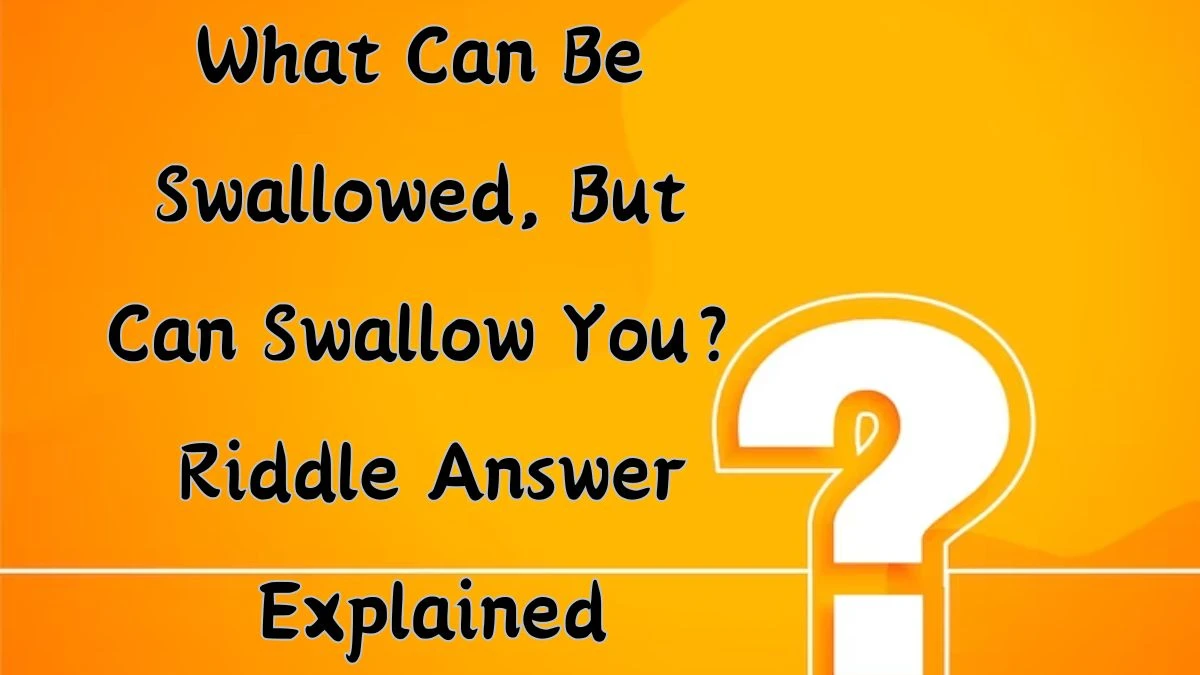- Rojgarlive »
- Riddle »
- What Can Be Swallowed, But Can Swallow You? Riddle Answer Explained
What Can Be Swallowed, But Can Swallow You? Riddle Answer Explained
by Preethi
Updated Feb 28, 2024

"What Can Be Swallowed, But Can Swallow You?" Riddle
Imagine something that you can eat, like food, which seems harmless when you swallow it. However, this thing isn't physical; it's a feeling that people have inside them. This feeling is called "pride." When you achieve something or feel good about yourself, you might feel proud.
But if you're not careful, this feeling can grow too big, making you arrogant and causing problems. So, while you can "swallow" pride by feeling it, if it becomes too big, it can "swallow" you by causing trouble or leading to downfall. It's a riddle that plays with words to make you think about both the positive and negative sides of pride.
"What Can Be Swallowed, But Can Swallow You?" Riddle Answer Explained
This riddle asks what can be swallowed but also has the power to swallow you. The answer to this intriguing question is "pride." Pride is a feeling of satisfaction or pleasure in one's own achievements or qualities. When we achieve something, we often feel proud, like we're swallowing that feeling of accomplishment.
However, pride can also have a negative side. When someone becomes overly proud or arrogant, their pride can consume them, leading to their downfall. So, while pride can be swallowed in the sense of feeling satisfied, it can also swallow a person by leading them to act in ways that harm themselves or others. This riddle cleverly captures the dual nature of pride, showing how it can be both a source of joy and a potential danger.
"What Can Be Swallowed, But Can Swallow You?"Riddle Answer: Pride
What is Riddle?
A riddle is like a puzzle wrapped in words, where a statement or question has a sneaky, hidden meaning that you need to uncover. There are two main types: enigmas, which are tricky problems expressed in fancy language, demanding you to think cleverly for the solution, and conundra, which involve playing with words in either the question or the answer. It's like a little linguistic game that challenges your brain.
Imagine it as a universal art form, found in cultures worldwide, each crafting their unique puzzles. Riddles, unlike myths that establish social norms, enjoy teasing the boundaries of ideas, showing that things aren't as straightforward as they seem. They playfully dance with concepts, making us think deeper and, in the end, affirming the importance of those boundaries.
How to Solve a Riddle?
Read Carefully:
Begin by thoroughly reading the riddle. Pay close attention to every word and detail. Sometimes, the solution lies in subtle nuances.
Identify Key Elements:
Identify the key elements or clues in the riddle. Look for words or phrases that might have double meanings or stand out as essential to solving the puzzle.
Think Creatively:
Riddles often require creative thinking. Consider different interpretations of the words and phrases presented. Don't limit yourself to the most obvious meanings.
Consider Wordplay:
Many riddles involve wordplay, such as puns or homophones. Explore whether any words have dual meanings or sound similar to other words that could provide a clue.
Look for Patterns:
Some riddles follow specific patterns or have a consistent theme. If you notice a recurring element or structure, it could be a clue to the solution.
Use Context:
Consider the context of the riddle. Sometimes, understanding the context or background information can lead you to the correct answer.
Test Hypotheses:
Once you have a potential solution in mind, test it against the clues provided in the riddle. Does it fit all the criteria? If not, reassess and try a different approach.
Collaborate:
If you're stumped, discussing the riddle with others can provide new perspectives. Group brainstorming can lead to breakthroughs and shared insights.
Patience is Key:
Solving riddles may take time. Be patient and don't get discouraged. Sometimes, stepping away and returning with fresh eyes can make a difference.
Learn from Solutions:
Whether you solve the riddle or not, take note of the solution. Understanding how the puzzle was crafted can enhance your riddle-solving skills for future challenges.
Riddle Solving Benefits
Thinking Skills:
Solving riddles helps your brain think better. It makes you look at things in different ways and figure out tricky problems.
Problem-Solving:
Riddles are like puzzles. They make you find solutions to challenges, teaching you how to think and solve problems smartly.
Being Creative:
Riddles are like little games for your imagination. They make you think creatively, which is helpful not just in fun stuff but also in subjects like math and science.
Remembering Things:
When you solve riddles, you need to remember details. This helps improve your memory, making it easier for you to remember things in school or in everyday life.
Working Together:
Some riddles are better solved with friends. Figuring them out together helps you work as a team, making you good at working with others.
Feeling Proud:
When you solve a tricky riddle, it feels like you achieved something cool. It boosts your confidence and makes you feel proud of yourself.
Learning New Words:
Riddles introduce you to new words. It's like a fun way to learn and use words you might not have known before.
What Can Be Swallowed, But Can Swallow You? Riddle Answer Explained - FAQs
The answer to the riddle "What can be swallowed, but can swallow you is pride.
A puzzling statement or question that requires clever thinking to solve.
Read carefully, identify clues, think creatively, consider wordplay, and test hypotheses.
Improves thinking skills, enhances problem-solving abilities, boosts creativity, strengthens memory, and expands vocabulary.
"I speak without a mouth and hear without ears. I have no body, but I come alive with the wind. What am I? An echo!"




